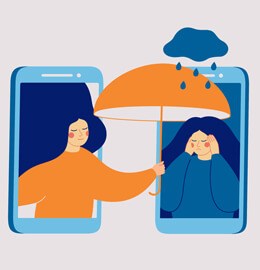Updated: May, 2015
© 2015 Think Social Publishing, Inc.
Anyone who has tried to find them knows that resources and services for adults with developmental and learning disorders are hard to find and then difficult to access. And anyone who has worked with or lives with someone with these challenges knows that there can be times when our loved one becomes discouraged, depressed, enraged, irrational, and possibly acutely at risk for harming him/herself or others.
When we activate the emergency system, we really do not know what will happen. Perhaps an experienced sheriff will arrive in a squad car with a partner in tow, and they will calmly provide support and structure to an otherwise out of control situation, settling things down and resulting in the recognition by everyone that we are all a big, connected society, no one is alone, and we will do what need to do to support each other and keep everyone safe. It seems like a fantasy, but it can happen - I've seen it. Of course, this ideal is a relatively rare outcome.
Often, when I recommend we get help from the 911 system, families decline, either embarrassed at what the neighbors will think or fearing a misunderstanding that will turn out causing more harm or trauma to the people involved. Sometimes the person settles down, and the episode blows over. Sometimes it does not, in which case the 911 system may be activated anyway.
Sometimes the police come and take a person into custody for the purpose of getting a psychiatric evaluation. By doing this they may be required to utilize only the county mental health system, so the person is transported to a county evaluation facility. More on that later.... Sometimes, most of the time in my experience, the process of taking someone into protective custody goes smoothly. The person who is having trouble is typically taken aback by the new situation and does not know how to react and does not really react until much later. On the other hand, sometimes a law enforcement officer will be clear and direct and stern about what needs to happen and the person will react in an intensified, rigid manner, and things may escalate.
If a person is actively aggressive or extremely agitated, and the police are aware that the person has a neuropsychiatric condition of some sort, they may call in a psychiatric emergency response team (PERT) and those people are typically quite good at settling down an agitated person, talking calmly, trying to engage a person, who is severely distressed due to psychiatric illness. The problem, however, is that they might not understand the issues, the culture, of, say, an autism spectrum disorder, and may not understand sensory issues, or may respond in an overly firm manner with a very rigid person and trigger a more severe distress.
Sometimes families decide they will try on their own to bring a person for urgent help and get the person into a car, risking open doors on the highway. If they do get to an ER or a psychiatric facility, more often that not they circle back and come home, feeling that the 'threat' is enough to control the person. Psychiatric facilities usually want a person to have been medically screened before they will accept that person for admission onto a psychiatric unit, which may mean a stop at the ER first. If they do drop in at the ER, they may wait for many hours unless the person is or becomes severely agitated, in which case the staff may want to use intramuscular medication to settle the person down.
Once a person is admitted to a medical or psychiatric facility, privacy laws may limit the contact with family unless expressed requested by the person admitted to the unit. That can be tricky, sine the person may not want to talk with his/her family, might not want the staff talking with family, or may not be in a state in which he/she is able to pursue this. To their credit, most psychiatric facilities use a social work type model to connect with family as soon as possible, if there is appropriate permission to do so. Ideally, the doctor is in touch with the family and the family is part of the team developing an understanding of the difficulties and how to address them and working on a plan for returning to outpatient care.
If staff is overwhelmed with too many patients then this team effort is undermined and families are in the dark and the plan is not well developed. So once the person settles down in the psychiatric facility, and the insurer or other reviewing authority deems that the person no longer poses an acute threat and therefore should be discharged home; there might be a discharge plan on paper that does little to change the circumstances leading to the hospitalization.
Treatment is complicated for a person with a developmental difficulty on a psychiatric unit. These are usually pretty safe places, but our distressed people with developmental difficulties seem to me to be more likely to react to the rules and rigid structure that is often present with a regression, often to destructive or self destructive behaviors. They might be frightened if there are other agitated people on the unit but really that is hard to help, as that is what these units are for: to contain several people at a time who are in severe distress and who may be highly agitated.
Staff members in psychiatric facilities are, in my experience, mostly good people who are dedicating their careers to helping others. They really try to help But in the course of perhaps many years of experience in this work, many have set ideas about what people in distress need, and this can be another problem: what works for a typical person with depression or bipolar disorder might not work for a person with, say, Asperger's or autism. It is unlikely that the staff will all want to learn, really fast, about the person's neurodevelopmental challenges and how to best manage them. And the staff shifts 2-3 times a day. I haven't started to talk bout the food, either. Suffice it to say that while psychiatric units are built and manned to provide a safe place to assess and intervene with people who are in severe distress and at risk to themselves or others, they are not build and staffed to manage people with developmental and learning disorders who are in severe distress. But we typically do not have a better acute solution.
Families can do a number of things to try to make an imperfect system work better. Conservatorships can give family member conservators the right to information, allowing and actually creating, from a legal standpoint, a collaborative system. It is also sometimes possible to develop over time a relationship with helping community systems, e.g., getting to know the local sheriff, coming closer to the ideal of having a family held and helped by the knowledge that they are not alone. It can be incredibly powerful for a mother to know and her adult son to know, for instance, that mother is not really by herself with him, and so he really does need to work with her and he cannot merely take advantage of her. Families do need to be assertive once their members are in a psychiatric facility, offering information, requesting family sessions, and asking a lot about the discharge planning and what that means, what resources can be set up, etc. Insurance companies must be helped to understand that the causes of a hospitalization do not evaporate once a person settles down on a structured unit, and so settling down does not mean 'ready for discharge.'
Finally, families benefit from having professionals they can rely upon to help them advocate for these things. When I have a patient in the hospital and I am not the inpatient doctor for that person, I work hard to get all the releases set up, contact the treatment team, get the family into the process, and try to ensure that there is a better plan in place for after the hospital that there was before. This is not easy and we do not generally get everything we want out of a hospitalization, however we often get some benefit, and often enough we can capitalize on the experience to reframe or retool what we are doing to the benefit of everyone involved.
There are probably many other issues, questions, or situation that I have not addressed in this brief article.
About the Author
Dr. Joshua Feder is a child and family psychiatrist with an active clinical practice in Solana Beach, seeing infants through adults and their families to address neuropsychiatric challenges. Dr. Feder is also a Senior Expert for the Early Years in Belfast, traveling to conflict and post conflict regions to support peace building through early childhood care.











